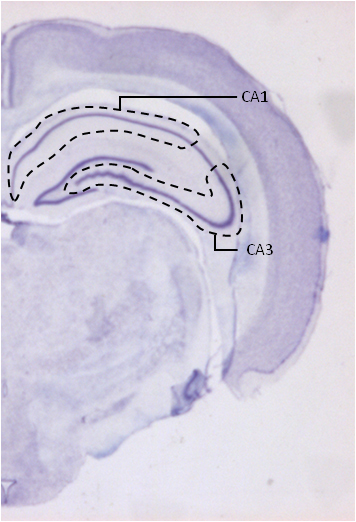
Scientists use Stereo Investigator to Discover that Part of the Hippocampus Shrinks in Socially Isolated Rodents
Social isolation is stressful. Scientists have known it for decades. They also know that isolation causes changes to occur in the brains of rodents and primates. But most studies examine the effects of isolation during childhood; and the ones that do focus on adulthood tend to use male subjects. For the first time, researchers in Spain show that long-term social isolation causes part of the brain to shrink in the adult female degu, a highly social rat-like animal native to South America.
The researchers used Stereo Investigator to measure the volume of the hippocampus and two of its sub-regions (CA1 and CA3) in the brains of degus that were either group-housed, or held alone for six and a half months. Using a Leica DRIV microscope equipped with a MicroFire digital camera, they analyzed cresyl-violet stained sections of the left-brain hemisphere, calculating total volume with the Cavalieri probe in Stereo Investigator. They saw one major difference: the isolated animals had a smaller CA1—part of the hippocampus involved in learning—though total hippocampal volume and CA3 volume remained unchanged.
In their paper, the scientists speculate that the decrease in CA1 volume may be due to dendrite shrinkage in pyramidal neurons or glial cell loss. Also, they associate the reduced volume with deficits in contextual fear memory—a measure of learning—that they saw during behavioral testing.

Scientists studied cresyl-violet stained sections of the left brain hemispheres of isolated and group-housed rodents. Image courtesy of the Venero Lab at The National University of Distance Education in Madrid, Spain.
When the scientists looked closer at the mechanisms behind learning and memory processes, they saw lower levels of a molecule known to regulate neuronal synaptic plasticity and contextual fear memory. Known as polysialylated neural cell adhesion molecule (PSA-NCAM), the molecule was reduced in synapses in the hippocampus of the isolated animals, according to the paper.
“In summary, this study reports that social isolation of adult female degus impairs contextual fear conditioning and reduces synaptic PSA-NCAM levels in the hippocampus. Interestingly, shrinkage of CA1, but not of CA3 or the total hippocampus, was found after long-term social isolation, an effect that may be related to the impairment we observed in contextual fear memory,” the authors say.
Pereda-Pérez, I., Popović, N., Otalora, B. B., Popović, M., Madrid, J. A., Rol, M. A., & Venero, C. (2013). Long-term social isolation in the adulthood results in CA1 shrinkage and cognitive impairment. Neurobiology of Learning and Memory.


